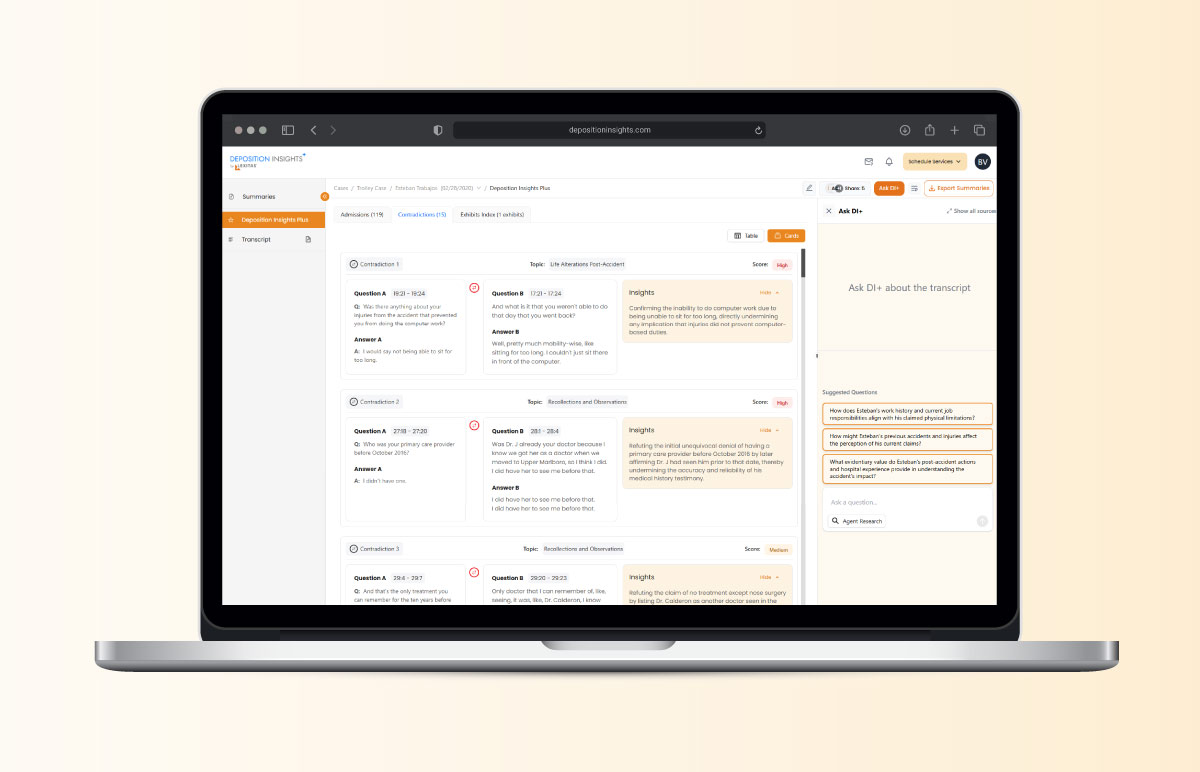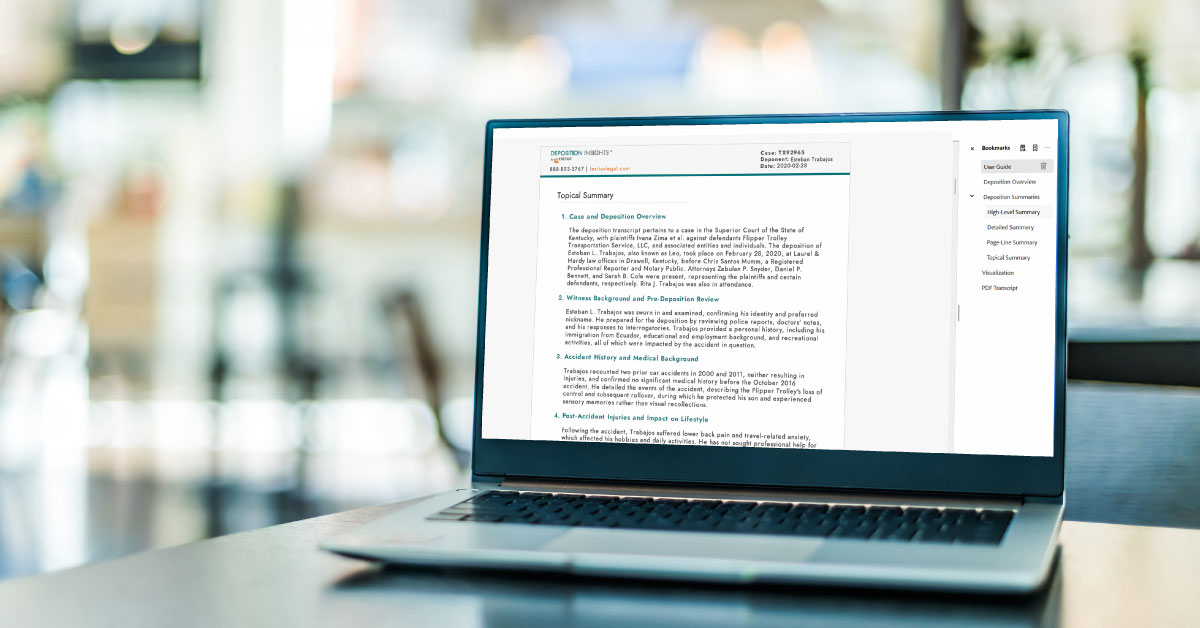Top 5 Legal Industry Trends of 2025
AI, Compliance, and the Future of Trial Preparation
October 9, 2025
Court Reporting
Top 5 Legal Industry Trends 2025: AI, Compliance, Trial Prep
At a Glance: The Top 5 Legal Industry Trends of 2025
- AI is transforming litigation support and trial preparation.
- Compliance pressures are reshaping legal workflows.
- Trial services are becoming a strategic advantage in high-stakes litigation.
- Workforce and operations are adapting to changing demands.
- Alternative paths to resolution are gaining momentum.
Trend 1: AI Is Transforming Litigation Support and Trial Preparation
According to the American Bar Association’s 2025 Legal Industry Report, more than 30% of legal professionals say they use generative AI personally, while about one in five firms report firm-wide adoption. This gap highlights the importance of expert oversight in integrating AI into trial preparation.AI in legal practice is becoming mainstream in 2025. Tools are improving speed, accuracy, and insight across litigation support. They are helping with transcript review, record summarization, and case strategy. Yet adoption must be balanced with human validation to ensure results are accurate and defensible.
Deposition Transcript Summary and Analysis ToolsThe rapid adoption of AI tools for legal professionals is changing how transcripts are reviewed, analyzed, and prepared for trial.
|
 |
AI Medical Record Summarization and Insights
AI-driven summarization condenses large volumes of medical records into clear timelines and case chronologies. This helps trial teams save time and build stronger narratives for court. Creating an accurate AI medical record summary can reduce review time from days to hours, freeing attorneys to focus on strategy.- AI summarization reduces the workload involved in reviewing complex medical and case records.
- Chronologies generated by AI make it easier to connect facts and events during litigation.
- Summaries provide clarity that supports both case preparation and courtroom presentation.
Expert Oversight in an AI-Driven Era
Even as AI tools advance, human validation remains critical. Attorneys, paralegals, and court reporters provide the context and judgment that technology cannot replicate.Expert oversight reduces risks of error and ensures that AI outputs meet legal standards. This balance between human skill and generative AI for law strengthens the reliability of trial preparation.
AI Insights for Case Strategy
AI is also being used to identify patterns in depositions and case documents. These insights help attorneys refine their arguments and prepare witnesses with greater confidence.- Deposition Pattern Recognition: AI highlights recurring themes and inconsistencies across testimony.
- Predictive Guidance: Data-driven insights give trial teams a stronger foundation for shaping case strategy.
Trend 2: Compliance Pressures Are Reshaping Legal Workflows
Compliance is now one of the most pressing issues in litigation. Regulations are growing more complex, and requirements often vary by state or jurisdiction. Failure to meet these obligations can result in penalties, reputational harm, or even invalidated cases.To reduce these risks, legal teams are turning to technology-enabled processes that ensure compliance is built into every stage of litigation. Secure retrieval, accurate process service, and reliable case tracking are no longer optional. They are essential for maintaining trust and avoiding costly setbacks.
HIPAA-Compliant Record Retrieval
HIPAA-compliant medical record retrieval ensures sensitive case data is handled securely while remaining accessible to litigation teams. Strong safeguards protect both clients and law firms from compliance failures.- Secure Transfers: Encryption and controlled access protect private health information.
- Audit Trails: Digital records track every step of the retrieval process for defensibility.
- Reliability: Standardized workflows reduce delays and prevent costly mistakes.
Jurisdictional Demands in Process Service
Service of process is not uniform. Each state and court may enforce different rules, and failure to comply can delay or derail a case.- States maintain unique requirements for service of process that must be followed closely.
- Mistakes in documentation or procedure can result in dismissed or postponed cases.
- Local knowledge and consistent tracking reduce the risk of errors.
Digital Case Tracking and Compliance Visibility
Modern litigation demands real-time visibility into every case milestone. Digital tracking tools enable the monitoring of dockets, document activity, and court updates with speed and accuracy, transforming what was once a manual process into a reliable compliance safeguard.- Automated Alerts: Up-to-the-minute docket notifications help teams stay ahead of new filings, hearing dates, and status changes.
- Audit-Ready Records: Each case event is logged and accessible in a secure, reviewable format that supports compliance checks and appeals.
- Efficiency Gains: Consolidated docket data reduces manual tracking and improves coordination across legal teams and jurisdictions.
Trend 3: Trial Services Become a Strategic Advantage in High-Stakes Litigation
Trial remains a defining factor in litigation outcomes. The right support helps attorneys focus on advocacy while reducing the stress of managing technical details. Specialized services now cover everything from courtroom technology to secure collaboration spaces, all designed to keep trials on track.The most effective trial preparation combines advanced technology with human expertise. Reliable technicians, experienced reporters, and well-organized infrastructure ensure that evidence is presented clearly and proceedings run smoothly. These services are no longer a luxury but a critical part of high-stakes litigation.
Hot Seat Operators and Courtroom Technology
Hot seat operators manage courtroom technology so attorneys can focus on presenting their case. Their work ensures evidence is delivered with precision and without disruption.- Seamless Exhibit Management: Documents and images are displayed exactly when needed.
- Synchronized Video: Testimony clips and exhibits align in real time for maximum clarity.
- Technical Confidence: Attorneys avoid distractions caused by technology failures.
War Rooms and Collaboration Spaces
War rooms give trial teams a secure base of operations near the courthouse. They allow lawyers, experts, and staff to coordinate strategy and access documents without leaving the trial environment.- Teams gain a private space for planning and reviewing evidence.
- Collaboration is easier when everyone is in one location close to the courtroom.
- Confidentiality is protected with secure access and dedicated facilities.
Reprographics, Graphics, and Document Repositories
Professional graphics and organized document systems strengthen trial presentations. Clear visuals help jurors and judges understand complex evidence, while secure repositories ensure that information is always accessible.- Compelling Graphics: Professional visuals simplify technical or detailed information.
- Secure Document Access: Digital repositories provide instant availability when evidence is needed.
- Organized Materials: Reprographics ensure exhibits are consistent and easy to reference.
Court Reporting for Trial Proceedings
Court reporters remain a cornerstone of trial preparation. Their certified transcripts provide accuracy for appeals and give attorneys the tools needed to adapt strategies during proceedings. Increasingly due to court reporter shortages courts are requiring attorneys to source and provide a court reporter for the proceeding. Comprehensive trial services support is becoming a strategic differentiator in high-stakes litigation.- Certified reporters produce reliable records that hold up in any venue.
- Real-time transcripts give attorneys the ability to adjust arguments during trial.
- Transcripts support appeals and post-trial analysis with confidence in accuracy.
Trend 4: Workforce and Operations Adapt to Changing Demands
Law firms and legal departments face increasing caseloads, hybrid work models, and budget pressure. These factors are driving a shift in how legal teams manage resources. Firms are turning to flexible staffing and outsourcing to stay competitive while controlling costs.Workforce trends in law show that agility matters more than ever. Contract attorneys, secondees, and outsourced review services give firms the ability to scale quickly. This model provides access to specialized expertise without the long-term expense of permanent hires.
Flexible Staffing Through Legal Talent Solutions
Flexible staffing allows firms to meet demand without overextending internal teams. Contract attorneys and secondees bring targeted knowledge and the ability to adapt to changing caseloads.- Contract Attorneys: Provide cost-effective support for short-term or specialized needs.
- Secondees: Deliver niche expertise while integrating into existing teams.
- Scalable Solutions: Staffing levels can expand or contract as case volume changes.
Document Review at Scale
Large-scale document review remains one of the most resource-intensive parts of litigation. Outsourcing helps teams manage volume and maintain quality.- High-volume reviews require systems that ensure consistency across thousands of documents.
- Outsourced review teams reduce the strain on in-house staff.
- Layered review processes and quality controls protect accuracy and compliance.
Trend 5: Remote and Hybrid Proceedings Become Standard Practice
Remote and hybrid proceedings have become standard practice across the United States. What began as a pandemic-era necessity has evolved into a permanent feature of litigation, driven by efficiency, accessibility, and broad satisfaction among attorneys and clients. Both state and federal courts now maintain standing policies that allow or require remote participation in hearings, depositions, and other pre-trial matters.State judiciaries—including those in California, New York, and Texas—have formalized post-pandemic rules that embed remote and hybrid hearings into everyday court operations. These frameworks provide judges with the flexibility to choose the most effective format for each matter, while also requiring technology standards that ensure fairness and participation. Surveys consistently highlight scheduling efficiency, reduced travel, and expanded access for rural and disabled participants as leading reasons for continued reliance on virtual formats.
Virtual Hearings and Depositions
Remote depositions and hearings are now an established part of the litigation landscape. Courts across the country have incorporated video-conference technology and remote-appearance procedures directly into their best-practice rules, setting clear expectations for connectivity, authentication, and recordkeeping.- Accessibility: Virtual formats allow attorneys, witnesses, and experts to participate from any location, reducing travel time and logistical barriers.
- Integration: Most courts and law firms now treat remote appearances as routine, supported by refined procedures for managing exhibits and testimony.
- Efficiency: Hybrid participation options streamline coordination across teams and improve overall case management.
Secure Platforms and Compliance Confidence
Advancements in remote-hearing technology have strengthened trust in virtual proceedings. Features such as multi-factor authentication, end-to-end encryption, and identity verification are now standard across court-approved platforms. Compliance frameworks, including HIPAA, ABA confidentiality guidelines, and state bar cybersecurity protocols, govern the management of remote participation.- Security: Encrypted connections and controlled access protect sensitive case information.
- Compliance: Courts enforce strict rules against unauthorized recording and require audit trails for participant activity.
- Access: Remote participation continues to expand access to justice for individuals with mobility or scheduling limitations.
Partnering for the Next Era of Legal Practice
The five trends shaping 2025 show how quickly the legal industry is evolving. AI is becoming part of everyday litigation support, compliance pressures continue to grow, trial services now play a direct role in outcomes, and staffing models are shifting. Together, these shifts point to the need for partners who can keep pace with change.Legal teams should look for a litigation support partner with proven expertise, nationwide coverage, and the ability to deliver secure, technology-enabled solutions. This combination ensures consistency in every venue and confidence that sensitive data is managed with care.
Lexitas brings that blend of experience and innovation. As a trusted legal services partner, Lexitas helps firms and corporate legal teams prepare for what comes next, providing the scale, reliability, and insight needed to succeed in the next era of practice.
Ready to strengthen your litigation strategy? Contact Lexitas today to get started.
Related Resources

Articles
Technology
2025 Trend Watch: AI Becomes a Competitive Advantage in Legal Services
In 2025 adopting artificial intelligence (AI) is no longer a choice but a strategic imperative for legal, insurance, and corporate leaders.
Read More
Articles
Technology
How AI Is Transforming Deposition Summaries: Part 2
AI is changing the way legal teams approach deposition review. It is no longer just about creating a simple AI-enabled summary.
Read More
WhitePapers
Record Retrieval
Understanding HIPAA Compliance For Law Firms
In this whitepaper we explore HIPAA, how it applies to law firms, best practices law firms can act on to protect themselves from violations and penalties.
Read More